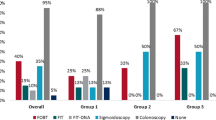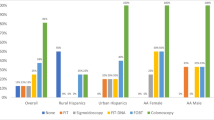Abstract
Knowledge of colorectal cancer (CRC) screening options remains suboptimal in Black populations, contributing to screening disparities. Guided by community-based participatory research (CBPR) principles, we partnered with five Black churches in Louisville, a region of Kentucky with high Black-white CRC screening disparities, to explore screening barriers and facilitators for CRC education and outreach. Project champions (n = 5) served as primary points of contact, developed project support within their churches, and were trained to recruit church and community members (n = 39) to participate in five semi-structured focus groups. Interview questions probed actual and perceived barriers to CRC screening, focusing on knowledge and perceptions of stool-based tests. Subsequent questions explored perceptions of different screening tests, CRC knowledge and beliefs, and trusted community locations for screening outreach. Transcripts were analyzed iteratively, and codes were derived inductively and refined to develop overarching themes. Participants experienced multilevel barriers to completing CRC screening. Primary themes about CRC screening included acknowledgment of importance, positive and negative personal experiences, need for increased outreach, and desire for greater cultural representation in educational materials. Participants frequently discussed perceptions of inadequate medical care, with most having only ever been offered colonoscopy; subsequently, knowledge of stool-based tests was low. To address this knowledge gap, participants stressed interpersonal communication from trusted individuals, such as local Black medical providers and CRC survivors. Given the low knowledge of stool-based testing among participants and identified inequities in receipt of clinical care, community-based CRC screening interventions are warranted to reduce Black-white CRC screening disparities.
Similar content being viewed by others
References
Kentucky Cancer Registry. Based on data released July 2021. Accessed October 6, 2022. https://www.cancer-rates.info/ky/
Rutter CM, Knudsen AB, Lin JS, Bouskill KE (2021) Black and White differences in colorectal cancer screening and screening outcomes: a narrative review. Cancer Epidemiol Biomarkers Prev 30(1):3–12. https://doi.org/10.1158/1055-9965.EPI-19-1537
Greiner KA, Born W, Nollen N, Ahluwalia JS (2005) Knowledge and perceptions of colorectal cancer screening among urban African Americans. J Gen Intern Med 20(11):977–983
May FP, Whitman CB, Varlyguina K, Bronley EG, Spiegel BMR (2016) Addressing low colorectal cancer screening in African Americans: using focus groups to inform the development of effective interventions. J Cancer Educ 31(3):561–574
Buehler JW, Castro JC, Cohen S, Zhao Y, Melly S, Moore K (2019) Personal and neighborhood attributed associated with cervical and colorectal cancer screening in an urban African American population. Prev Chronic Dis 16:190030
U.S. Census Bureau. American Community Survey 2021 1-year estimates. Census Reporter Profile page for Jefferson County, KY. Accessed October 6, 2022. http://censusreporter.org/profiles/05000US21111-jefferson-county-ky/
US Preventive Services Task Force, Davidson KW, Barry MJ et al (2021) Screening for colorectal cancer: US Preventive Services Task Force recommendation statement [published correction appears in JAMA. 2021 Aug 24;326(8):773]. JAMA. 2021;325(19):1965–1977. https://doi.org/10.1001/jama.2021.6238
Zhu X, Parks PD, Weiser E, Fischer K, Griffin JM, Limburg PJ, Finney Rutten LJ (2021) National survey of patient factors associated with colorectal cancer screening preferences. Cancer Prev Res 14(5):OF1-11
Ward SH, Parameswaran L, Bass SB, Paranjape A, Gordon TF, Ruzek SB (2010) Resident physicians’ perceptions of barriers and facilitators to colorectal cancer screening for African Americans. J Natl Med Assoc 102(4):303–311
Inadomi JM, Vijan S, Janz NK et al (2012) Adherence to colorectal cancer screening: a randomized clinical trial of competing strategies. Arch Intern Med 172(7):575–582. https://doi.org/10.1001/archinternmed.2012.332
Gupta S, Halm EA, Rockey DC et al (2013) Comparative effectiveness of fecal immunochemical test outreach, colonoscopy outreach, and usual care for boosting colorectal cancer screening among the underserved: a randomized clinical trial. JAMA Intern Med 173(18):1725–1732. https://doi.org/10.1001/jamainternmed.2013.9294
Arnett MJ, Thorpe RJ Jr, Gaskin DJ, Bowie JV, LaVeist TA (2016) Race, medical mistrust, and segregation in primary care as usual source of care: findings from the Exploring Health Disparities in Integrated Communities study. J Urban Health 93(3):456–467. https://doi.org/10.1007/s11524-016-0054-9
Blumenthal DS, Smith SA, Majett CD, Alema-Mensah E (2010) A trial of 3 interventions to promote colorectal cancer screening in African Americans. Cancer 116(4):922–929
Braun V, Clarke V (2006) Using thematic analysis in psychology. Qual Res Psychol 3(2):77–101
Vilaro MJ, Wilson-Howard DS, Neil JM et al (2021) A subjective culture approach to cancer prevention: rural black and white adults’ perceptions of using virtual health assistants to promote colorectal cancer screening. Health Commun 37(9):1123–1134. https://doi.org/10.1080/10410236.2021.1910166
Hovick SR, Yamasaki JS, Burton-Chase AM, Peterson SK (2015) Patterns of family health history communication among older African American adults. J Health Commun 20(1):80–87. https://doi.org/10.1080/10810730.2014.908984
Scaglioni G, Guidetti M, Cavazza N (2021) The role of disgust as an emotional barrier to colorectal cancer screening participation: a systematic review and meta-analysis [published online ahead of print, 2021 Aug 25]. Psychol Health 1–20. https://doi.org/10.1080/08870446.2021.1967351
Zhu X, Parks PD, Weiser E, Jacobson DJ, Limburg PJ, Finney Rutten LJ (2021) Barriers to utilization of three colorectal cancer screening options - data from a national survey. Prev Med Rep 24:101508. https://doi.org/10.1016/j.pmedr.2021.101508
Adams LB, Richmond J, Corbie-Smith G, Powell W (2017) Medical mistrust and colorectal cancer screening among African Americans. J Community Health 42(5):1044–1061. https://doi.org/10.1007/s10900-017-0339-2
US Preventive Services Task Force, Davidson KW, Mangione CM et al (2022) Collaboration and shared decision-making between patients and clinicians in preventive health care decisions and US Preventive Services Task Force recommendations. JAMA. 327(12):1171–1176. https://doi.org/10.1001/jama.2022.3267
Association of American Medical Colleges. Diversity in medicine: facts and figures 2019. Accessed June 18, 2022. https://www.aamc.org/data-reports/workforce/interactive-data/figure-18-percentage-all-active-physicians-race/ethnicity-2018
Roy S, Dickey S, Wang HL et al (2021) Systematic review of interventions to increase stool blood colorectal cancer screening in African Americans. J Community Health 46(1):232–244. https://doi.org/10.1007/s10900-020-00867-z
National Colorectal Cancer Roundtable and American Cancer Society. 2022 messaging guidelines for Black and African American people. Accessed July 28, 2022. https://nccrt.org/resource/2022-messaging-guidebook-black-african-american-people/
Acknowledgements
The authors wish to acknowledge our community and church partners, without whom this project would not have been possible. We thank them for their continued support, advocacy, and leadership in working to eliminate cancer disparities in Kentucky and beyond.
Funding
This research was supported by the National Center for Research Resources and the National Center for Advancing Translational Sciences, National Institutes of Health, through Grant UL1TR001998 and by the National Cancer Institute through the Cancer Center Support Grant P30CA177558.
Author information
Authors and Affiliations
Corresponding author
Ethics declarations
Conflict of Interest
The authors declare no competing interests.
Disclaimer
The content is solely the responsibility of the authors and does not necessarily represent the official views of the NIH.
Additional information
Publisher's Note
Springer Nature remains neutral with regard to jurisdictional claims in published maps and institutional affiliations.
Rights and permissions
Springer Nature or its licensor (e.g. a society or other partner) holds exclusive rights to this article under a publishing agreement with the author(s) or other rightsholder(s); author self-archiving of the accepted manuscript version of this article is solely governed by the terms of such publishing agreement and applicable law.
About this article
Cite this article
Kruse-Diehr, A.J., Cegelka, D., Holtsclaw, E. et al. Barriers and Facilitators to Stool-Based Screening for Colorectal Cancer Among Black Louisville Residents. J Canc Educ 38, 1050–1058 (2023). https://doi.org/10.1007/s13187-022-02231-2
Accepted:
Published:
Issue Date:
DOI: https://doi.org/10.1007/s13187-022-02231-2




